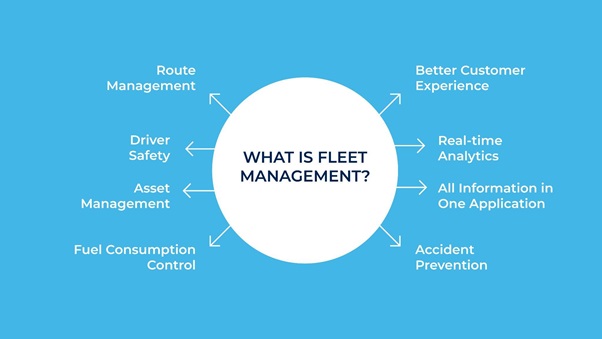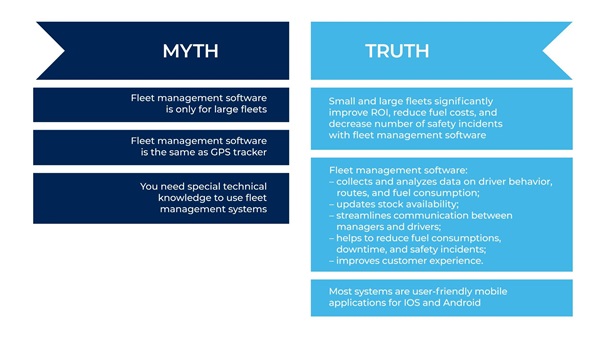From a small shop in the corner in your neighborhood to large international delivery services, companies all over the world and industries depend on commercial vehicles to transport their employees and goods every day. Fleet is another word for these commercial vehicles, and frequently it’s one of the most expensive assets for businesses.
To cut down the expenses, monitor operations effectiveness, and improve driver safety business address to logistics management software development, in particular, fleet management.
Fleet Management: What is It?
Fleet management refers to the process of keeping a fleet running on time, efficiently, and within the budget. Fleet managers may utilise the offerings on comparison sites like iCompario to monitor their operations. Such operations include vehicle maintenance, dispatch and routing, asset utilization, fuel consumption and costs, driver safety, and regulatory compliance to improve business process efficiency and decrease instances of waste.

5 Main Benefits of Fleet Management
Fleet management software operates through leveraging vehicle tracking systems such as GPS that enable it to receive up-to-date information on vehicle location, maintenance, speed, weather conditions, etc. Through collecting and analyzing this data, companies can get valuable insights into vital business operations and take necessary steps to improve them in a number of key areas.
1. Driver Safety
One of the biggest challenges for fleet managers is keeping drivers safe especially when they are hundreds of miles away from the vehicle. Through engine diagnostics and vehicle trackers, fleet managers can check if drivers are overspeeding, or braking too aggressively. For example, if the drivers are exceeding the speed limit on a craggy road with sharp turns, they will be alerted with visual and audible warnings. The fleet manager will also receive a notification to connect with drivers if the problem remains. The access to data about different drivers allows managers not only to monitor them in real-time but analyze the driving patterns of each of them, preventing incidents in the future and choosing the safest and shortest routes depending on traffic, landscape, and weather conditions.
According to the US National Highway Traffic Safety Association, with the implementation of AI in route planning, 22,2% of the crash report was brought down because of its ability to detect roadblocks, intersections, heavy traffic, and roundabouts.
2. Cost Reduction
Automation is one of the biggest advantages that vehicle fleet management software brings. Through the usage of automated reminders, managers can systematically control vehicle maintenance, repairs, and fleet inspections. Tracking vehicle downtime as a result of breakdowns, jumpstarts, and emergency servicing helps managers identify potential problem areas that may need actions taken in the maintenance schedule. Consequently, companies prolong the longevity of the fleet, saving redundant expenses on buying new vehicles and time spent on unplanned repairs.
As fuel consumption may increase on specific routes and as a result of the driving manner of certain drivers, fleet managers can also monitor the vehicles that consume more fuel and the exact reason for this. Contrary to popular belief, fuel consumption doesn’t depend exclusively on mileage. Multiple factors such as unnecessary stoppages, unoptimized routes, excessive idling, and discouraged drivers influence it.
According to the research, 36% of companies managed to cut down their fuel expenses by implementation of fleet tracking systems.
3. Increased Performance
A successful and profitable business is always beneficial not only for its owners and customers but also for staff and stakeholders. Fleet management systems offer some extra perks toward driver satisfaction. Apart from the usage of robust telematics solutions that allows to reduce risks on the road and reinforce durability, fleet managers can also increase drivers’ motivation through the implementation of driver scorecards. Cultivating competitiveness among drivers helps to improve their KPIs and offers some bonuses for best-performing employees such as salary raises, promotions, or one-time rewards. By improving the everyday experience of the drivers, companies not only decrease operational costs but also positively influence driver retention which is one of the biggest challenges in the industry.
4. Better Customer Experience
By leveraging fleet management tools, managers get the ability to ease the bookings process and set regular appointment reminders, optimize routing and achieve error-free deliveries. For example, if a technician is delayed or hasn’t viewed the task sent to them, they receive a notification from the manager. This way, customers get confirmation of appointments and reminders about delivery beforehand and can benefit from enhanced ETA accuracy through GPS tracking data. Drivers also can view customers’ location on their dashboards and adjust their working hours based on the estimated time of deliveries. They can also send information about their current location and arrival times directly to customers, establishing direct contact with them.
Companies have experienced a 54% improvement in customer service as a result of fleet tracking in 2020.
5. Business Intelligence
One additional benefit of fleet management tools is that they can serve as a great source of data that can be used for business intelligence improvement and meet reporting needs. Modern BI tools leverage machine learning, visualization techniques, and artificial intelligence for creative and innovative data analysis and presentation. A simple example of using such tools might be the creation of bespoke reports that can be produced for staff, executives on different levels, and even customers. Fleet managers greatly benefit from such reports as they can back up their decisions with accurate statistics. Worth mentioning that usage of BI solutions eliminates the issue of inconsistencies that regularly are associated with manual reporting, which significantly improves the level of confidence in the decisions being made.
The aforementioned tools can also allow stakeholders to come up with much more efficient ways of performance measurement by using various metrics which make sense for a particular fleet since each company is unique. Fleet management systems can be integrated into other legacy software systems by using API to unify disconnected streams of data or communicate with Internet of things devices to gather even more data for analysis.

Bottom Line
Fleet management systems go beyond dots on the map, they provide real-time visibility of logistics operations at the same time decreasing fuel usage, vehicle wearability, and increasing driver satisfaction and work conditions through predictive analytics and precise reporting. Businesses receive the opportunity to deliver faster and cheaper services, increase customer satisfaction, continuously checking the pulse of their business.


































